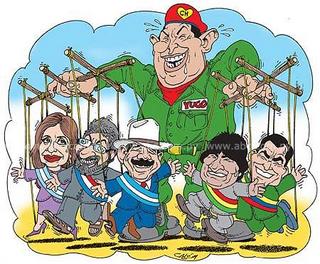According to “whiteys”, Hugo Chavez was responsible for the 2009 political crisis in Honduras.
There are several versions of this theory, but the most radical one claims that Manuel Zelaya received financial support from Hugo Chavez to win the elections of 2.005 through electoral fraud, others say that Manuel Zelaya was diverted to the Chavista left when he signed the accession of Honduras to ALBA.
The modus operandi of the Chavista left is to rise to power through the ballots, and once in power to destroy democracy from within, destroying the separation of the branches of government, creating new political constitutions to enable them to obtain totalitarian powers, establishing unlimited presidential re-elections, allowing them to perpetuate themselves in power through electoral fraud.
This is what Hugo Chavez sought to do in Honduras through Manuel Zelaya, because Manuel Zelaya is nothing more than a lackey of Hugo Chavez.
Zelaya’s administration strongly promoted the idea that it was necessary to change the Constitution in order to solve the problems of Honduras, but it never explained what those changes were.
The initial plan was to hold a referendum or plebiscite to ask people whether they wanted a new constitution. This consultation would take place the day of presidential elections: November 29, 2009.
But Zelaya never received congressional approval for the legal framework that would allow this consultation, so Zelaya decided to break the law, and to legitimize this consultation he arranged for another consultation, which would ask the people if they wanted to be consulted on the issue of whether to create or not a new constitution for Honduras.
This new consultation, totally illegal, was just a smokescreen Zelaya used to save time and hide his true intent, which failed, because everyone in Honduras knew that the real intention of Zelaya was to stay in office forever, although the Constitution of Honduras prohibits presidential reelection.
2.009 was scheduled as an election year in Honduras, and normally the electoral issues capture the attention of the press, but Manuel Zelaya overshadowed the issue of elections with his campaign for the “fourth ballot box” or referendum.
In this campaign a seed of hatred was planted against all of those who opposed the Chavista plans of Zelaya, accusing them of being “tools of the oligarchy,” or at best: “useful idiots.”
It was obvious that Zelaya did not want to have presidential elections, because he didn’t provided enough funds to the Supreme Electoral Tribunal, a body responsible for conducting the electoral process, and that’s why he refused to submit the annual national budget, with the objective of embezzling the government’s funds to invest them in the illegal referendum.
Zelaya was informed of the decisions of the Judiciary, which prohibited him from performing such consultation, but he was arrogant and he believed himself to be above the law.
June 28 was the day set for the consultation, which could not be performed because Zelaya was expelled from the country and the electoral material was seized.
The electoral fraud of Zelaya was discovered, that he had prepared an executive decree ordering the immediate convening of a Constituent National Assembly. Zelaya wanted to dissolve the Supreme Court and Congress that day, because they oppose their totalitarian plans for staying in office.
This plan of Zelaya was a real coup, and the removal of Zelaya was made to prevent that coup, but the world could not understand this, because of the disinformation campaign conducted by Hugo Chavez and the international Left.
The Supreme Court issued an arrest warrant against Zelaya, for abuse of authority and treason, among others, but the military responsible for the capture of Zelaya decided that for national security issues it was preferable to oust Zelaya of the country before a mob may try to free him.
To fill the resulting power vacuum, Congress decided to swear in Roberto Micheletti as president of the Republic, to whom belonged this high office as virtue of being the next in the line of command in accordance with the Constitution.
Roberto Micheletti was a legitimate president and not a de facto president, as stated by Honduras’ enemies, because Zelaya had been automatically removed from office under Article 239 of the Constitution, for promoting re-election.
Roberto Micheletti behaved as a true national hero resisting international pressure to resign.
The population endured the Zelayista terrorism financed by Hugo Chavez, so it was necessary to declare several days of curfew, as it was necessary to reduce street violence.
For his part, Zelaya was stubbornly defaming his country, throwing absurd accusations of human rights violations, but later, under U.S. pressure, he decided to sign an agreement with the Micheletti administration, an agreement that he ignored when he realized it didn’t suit him.
But it was too late for Zelaya, because that agreement allowed the recognition of the 2.009 elections by the United States.
The elections were conducted successfully, despite the boycott attempt by Hugo Chavez. But the Chavez conspiracy did not end with the inauguration of a new president in Honduras.
It has been shown that the new president, Porfirio Lobo, bends easily to Zelayista interests, while pretending to be a moderate. President Lobo is part of the Chavista conspiracy against Honduras, which has entered into a new phase.
Problems with this story
The removal of Zelaya gave the impression of a real coup. The reasons against this give the impression of being mere rationalizations.
This conspiracy theory didn’t have an international propaganda diffusion, so it was easy to bury the truth under tons of lies.
“Whiteys” exaggerate when they see the shadow of Hugo Chavez everywhere.
